人教版高中英语选修6全册教案
最新人教版高中英语选修六各单元阅读全英文教案(全册 共5个单元)

最新人教版高中英语选修六各单元阅读全英文教案(全册)Unit 1 ArtPeriod2 ReadingTeaching aimsEnable students to learn something about the western arts ,and learn how to describe a painting.Teaching proceduresStep1 BrainstormingHow much do you know about art? Have you ever been to an art gallery?Do you find your visit interesting?What can you think of when looking at the word “art”?Step2 Pre-reading1.kinds of painting:2.Can you name some famous paintings and painters in the world?3.DifferencesWestern paintings:Realistic detailed, rich in color, line and shapeAbout religion, humanChinese paintings :It is often about nature, such as mountain, water, bird-and-flower, etc. It has the symbol of harmony (和谐)and peace.Step3 Fast reading1.W hat’s the main idea of the text?has changed a lot with going by.2.How many styles of Western painting are mentioned in the text? What are they?.3. How is the passage organized?4. The author’s main purpose in writing this passage is to ________.A. have you believe somethingB. make you laughC. tell you how to do somethingD. give you informationStep3 Careful readingPart2:The Middle Ages1.Q: What are the paintings of this period full of ?2.True or falsea. Artists of this period were interested in showing nature and people as they really were.b. Paintings in the Middle Ages were very realistic.Part3:The Renaissance1. Painters in Renaissance began to focus onA. religionB. humans and natureC.scienceD. society2. In Renaissance, painters returned to classical and ideas about art.A. Roman, ParisB. Greek, LondonC. Roman, Greek3.Which of the following is not the things the rich people paid famous artists to paint?A.The rich people themselvesB. houses and possessionsC. the godD. activities and achievements4:.What are the two important discoveries in the Renaissance period ?They were drawing in andPart4 Impressionism1 Changes:In society :Changed …from toIn life:moved fromIn art: led tobroke away fromimpressionists2 Feature:3 Why did the impressionists have to paint quickly?Part5 Modern artImpressionism is the start of Modern ArtTwo extremesStep4 Draw a conclusion:1.Western art has changed very little over the last 17 centuries.2.Painters in the Middle Ages painted mainly religious subjects.3.Paintings in the Middle Ages were very realistic.4.Renaissance painters tried to paint things in a realistic way.5.Two important discoveries in the Renaissance periodwereoilpaintsand drawing in perspective.6.Impressionists painted their pictures mainly indoors.7.At first people did not like the impressionists’ paintings.8.Modern art began with the impressionists.Step6 Let’s tell the right style of the paintings1.Mona Lisa2.Seated women3.Sun flowers4The kiss of JovahBy Leonardo da Vinci by Picasso by Vincent Van Gogh by Giotto di Bondone 1D2B3C4AA.The Middle Ages B Modern artC Impressionism D The RenaissanceStep7discussionDiscuss the following topic in groups:What kind of art do you like best? Why?( The head of each group should write down every member’s idea, then try to give a report. )Step8 Homeworkwrite a summary.Do not include your own opinion, but be sure to use our own words (about 30words.)Unit 2 PoemsPeriod 2 ReadingTeaching Aim: To cultivate students’ interest of poetry and improve their reading skills.Ability aim: Enable the Ss to talk about poems and write or translate a poem.Help the Ss to write or translate a poem.Teaching important pointHow to help the students to grasp and remember the detailed information of the reading material. Teaching difficult pointHelp the Ss to write or translate a poem.Teaching aimSkimming and Scanning ;individual, pair or group work; discussion.Teaching Procedure:Step 1 Warming upThe teacher shows three pictures and ask1. Which poems and poets can you think of when seeing the following pictures?Step 2 BrainstormingDiscuss the reasons why people write poems.Step 2 Fast readingScan the passage and answer the following questions.1. What is the main topic of the reading passage?2. What five kinds of poems does the reading passage talk about?different forms of English poemsnursery rhymes, list poems, cinquain, haiku, Tang poems.3. Scan the poems and fill in the form in pre- reading.Step 3 Careful readingT: Now let’s read the following five poems and finish tasks.Slide showListen to Poem A and pay attention to its rhyming lines and words.Read the poem by yourself again and answer the following questions.1. What’s the baby’s father going to buy if the looking-glass gets broken?2. What is Papa going to buy for the baby if that billy-goat runs away?3. What are the features of it?Keys:1. a billy -goat2. another billy-goat3. It has strong rhythm and rhyme and has a lot of repetition.Poem CRead the poem C and answer the followquestions1. Did his or her team win the game?2. Why his or her team didn’t win the game?3. Does the speaker really believe his or her own excuse? How do you know?Keys:1. No, his or her team didn’t win.2. The players didn’t win because: Jack didn’t score that goal; they didn’t have enough time; they hadn’t trained hard….3. The speaker doesn’t really believe his or her own excuses, because there has too many ifs…Poem D&E1. What subject is the speaker writing about?2. Does the speaker like the subject? Give a reason for your answer.T: We have enjoyed so many English poems. Some are traditional forms of English poetry but some are not, for example haiku. (It comes from Japanese).In fact English speaker also have borrowed from another kind of Asian poetry---Tang poems from China. Poem H at the bottom of this passage is a translation from the Chinese.The translation of Poem H望夫石王健望夫处,江悠悠。
人教版高中英语选修六:Unit+2+Poems+reading+教案.doc
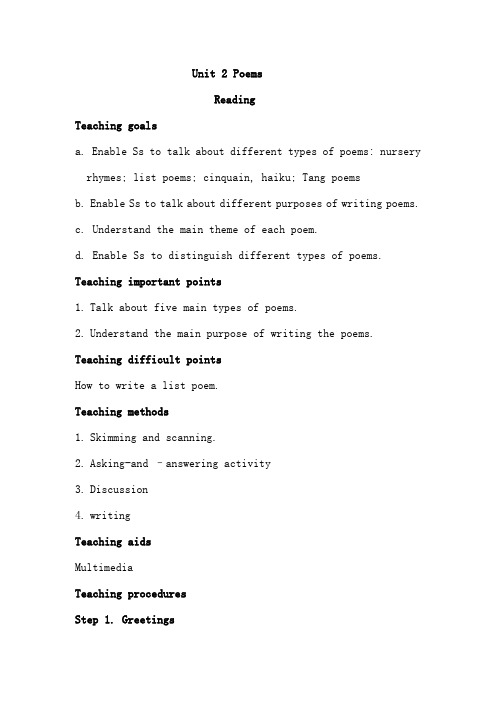
Unit 2 PoemsReadingTeaching goalsa. Enable Ss to talk about different types of poems: nursery rhymes; list poems; cinquain, haiku; Tang poemsb. Enable Ss to talk about different purposes of writing poems.c. Understand the main theme of each poem.d. Enable Ss to distinguish different types of poems. Teaching important points1.Talk about five main types of poems.2.Understand the main purpose of writing the poems. Teaching difficult pointsHow to write a list poem.Teaching methods1.Skimming and scanning.2.Asking-and –answering activity3.Discussion4.writingTeaching aidsMultimediaTeaching proceduresStep 1. GreetingsStep 2. Lead-inDo you like listening songs? I am sure that you like listening songsvery much and you like many popular singers. For example, Zhou Jielun, Wang Fei and so on. So at first, I will share a song with you. Show the song “little star” and ask the students to follow if they can sing.Brainstorming: can you predict some characteristics from the colorful words. (star, are; high, sky; gone, on; light, night.)Tell the students that this is a song and a poem as well. So the colorful words show the rhyme of a poem.Step 3.Warming upLet the Ss enjoy the English form of some pieces of famous Chinese poems and try to translate them into Chinese. Try to experience the difference between the English forms and the Chinese ones.Step 4.Reading1.fast readingAnalyze the structure of the passage and divide the passage into two parts, one part is the poems, another part is the introduction of the poems.(1)Let the Ss read just the introduction and try to answerthe question: How many kinds of the poems mentioned in the passage?(2)Read the introduction again and try to match thecharacteristics to the certain kind of the poem.2.SkimmingSkim from Poem A to Poem H and finish the flowing chart3. Careful reading:Read some of the pomes and answer the following questionsLook through poem A and choose the best answer:1.What’s the baby’s father going to buy if the mirror getsbroken?A. a mocking birdB. a diamond ringC. a looking glassD. a billy-goat2. What is Papa going to buy for the baby if that billy-goatruns away?A. a looking glassB. todayC. another billy-goatD. nothingLook through poem C and answer the following questions1. What sports do you think the speaker is writing about?2. Did his team win the game?3. How many excuses did they make to explain why they didn’t win?Read poem H and try to choose a best titleA.蝶恋花B.竹枝词C.望夫石D.一剪梅Which of the following words can convey the woman’sfeelingsA. lonelinessB. joyC. loveD. trustE. angerF. hateG. sorrowStep 5. practicingLearn to write a list poem.(1.)Analyze the characteristics of the list poem: List poems have a flexible line length and repeated phrases which give botha pattern and a rhythm to the poem. It is a poem that list things.(2.) Read poem B and poem C and try to experience the characteristics of the list poems.(3.) pair-work: give the title: “Friendship is …” and let the Ss discuss in group of four and try to write down some sentences. Divide the students into 4 groups and set a group leader for each group. And ask the group leader to collect the sentences of the poems.(4.) at last, ask the students to write down the poem of each group(5.) enjoy the works of the students together.Step 6. Homework1. Surf some websites to find out more beautiful poems.2. write a list poem.精美句子1、善思则能“从无字句处读书”。
高中英语人教版选修六教案:Unit+4单元教案
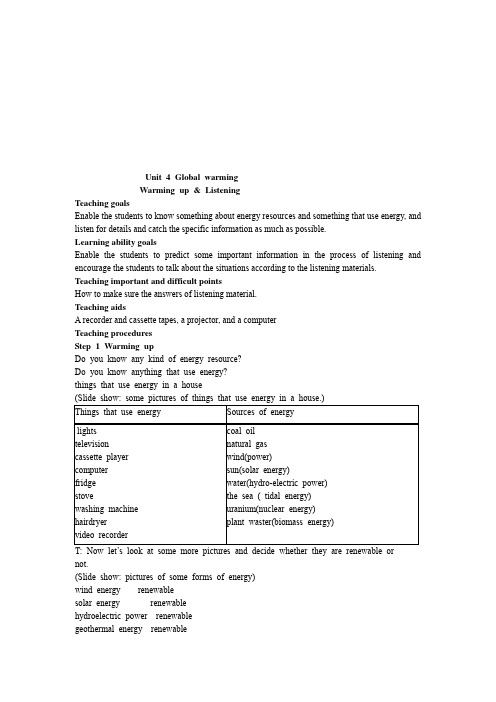
Unit 4 Global warmingWarming up & ListeningTeaching goalsEnable the students to know something about energy resources and something that use energy, and listen for details and catch the specific information as much as possible.Learning ability goalsEnable the students to predict some important information in the process of listening and encourage the students to talk about the situations according to the listening materials.Teaching important and difficult pointsHow to make sure the answers of listening material.Teaching aidsA recorder and cassette tapes, a projector, and a computerTeaching proceduresStep 1 Warming upDo you know any kind of energy resource?Do you know anything that use energy?things that use energy in a house(Slide show: some pictures of things that use energy in a house.)Things that use energy Sources of energylights television cassette player computerfridgestovewashing machine hairdryervideo recorder coal oilnatural gaswind(power)sun(solar energy)water(hydro-electric power) the sea ( tidal energy) uranium(nuclear energy) plant waster(biomass energy)T: Now let’s look at some more pictures and decide whether they are renewable or not.(Slide show: pictures of some forms of energy)wind energy renewablesolar energy renewablehydroelectric power renewablegeothermal energy renewabletidal energy renewablebiomass energy renewablenuclear power plant, non-renewable (picture)an oil refinery(精炼厂), non-renewable (picture)coal power station, non-renewable (picture)natural gas non-renewable (picture)uranium Ore (铀矿石) non-renewable (picture)The element uranium does not occur in pure form in nature but is found in minerals such as carnotite(钒钾铀矿), pictured above. (picture)Conclusionnon-renewablecoal oil natural gas Uranium fossil fuelsrenewablewind (wind power) sun (solar energy) water (hydro-electric power)plant waste (biomass energy) hot springs or geysers (geothermal energy)the sea (tidal energy)Slide showWhat are fossil fuels?Ancient animal and plant material below the surface of the earth with a high carbon cont ent, such as coal, oil and natural gas, which can be burnt to produce energy.Also known as non-renewable energy because once they are used they have gone forever; they cannot be renewed.Step 2 Pre-listeningRead Exercise 1 together:1. Read the statements below and tick the ones you agree with.2. Listen to the tape and answer and decide which statement Professor Chen doesNOT agree with.1. We'll have to stop using fossil fuels.2. About 90% of the world's energy comes from fossil fuels.3. We can replace fossil fuels with renewable sources of energy.4. Nuclear power is a good source of energy.5. In the future, we'll need new technologies to replace fossil fuels.6. It's the developed countries who are to blame for producing most of the carbon dioxide.3. Listen again and tick the phrases that Professor Chen uses to agree or disagreewith Li Bin.Slide showExactly. I’m afraid I disagree with you.That’s true. I’m afraid not.That’s right. I don’t think so.That’s correct. No way.I agree. I don’t agree.4. Listen for the third time and fill in the blanks.1.Our modern _________ societies depend on the energy we get from_________.2.It’s a very ____________ and cheap form of energy.3.Can’t we just ________ fossil fuels with ________ sources of energy like sun or wind power?4.However, whatever we do, we have to do it as a ________________.5.The _________ countries are really the ones to ______.Keys:1.industrial; fossil fuels 2. concentrated 3。
人教版高中英语选修六全册教案(76页)

人教版高中英语选修6 优质教案全套Unit 1 ArtVocabulary and Useful ExpressionsTeaching Goals:1.To enable Ss to master some new words and expressions2.To get Ss to have knowledge of this grammar point: the subjective moodTeaching Procedures:Step 1. Free talkIf you have a special chance to become a poet, what kind of poems will you write to people?And why?Step 2. Word studyPurpose: To consolidate the words and phrases in the text.1.Find a word in the poems that rhymes with each of the words below. Then add other words that rhyme. The first one has been done for you.(1)dead lead red thread fed said bed(2)high(3)sing(4)today(5)lace(6)trueSuggested Answers:(2)high sky pie my fly shy lie(3)sing ring wing thing king fling string(4)today away say play lay tray may(5)lace race face case chase place space(6)true too new flew few shoe canoeplete the passage using the words below in the correct form.c o t t a g e r u n o u t o f n u r s e r y r h y t h m r e c i t e r h y m eWhen I was a baby, my mother used to read me rhymes, I loved their and the way the words at the end of the lines. By the time I was two years old, I could at least ten of them. When we new nursery rhymes, my mother would go to the store to buy another nursery rhyme book. In fact, my family loved reading so much that the living room in our was full of books.Suggested Answers:nursery; rhythm; rhyme; recite; run out of; cottage.3.In English we sometimes add –ful to a noun to make an adjective. For example, wonder becomes wonderful. This means full of wonder. Now make adjectives form these nouns. Then add four other pairs you know.(1)beauty (5) dread (9)(2)joy (6) hope (10)(3)sorrow (7) peace (11)(4)delight (8) power (12).Suggested Answers:(1) beautiful (2) joyful (3) sorrowful (4) delightful (5) dreadful(6) hopeful (7) peaceful (8) powerful (9) thankful (10) successful (11) painful (12) usefulplete the table with the correct nouns, verbs, adjectives or adverbs.Noun VerbAdjectiveAdverbangrydarkenimpressiverepetitivetransformationaltranslationwarmenjoyexpressivelyinspireSuggested Answers:Noun VerbAdjectiveAdverbanger anger angry Angrilydark darken dark darklyimpression impress impressive impressively repetition repeat repetitive repetitively transformation transform transformational \translation translate translated \warmth warm warm wrmlyenjoyment enjoy enjoyable enjoyably expression express expressive expressively inspiration inspire inspirational inspirationallyplete each sentence using the correct word from the table you have just completed. (1)While you were reciting the poem, I think you moved your body very . It made the performance much more interesting.(2)Ad I lay in the , the words of a new poem came into my head.(3)The teacher doesn’t think that the of the Tang poem is very good.(4)Songs are often easy to remember because they a lot of poetry.(5)Your talk was so that I want to go and write lots of poetry.(6)I loved the strong images you used in your poem to convey feelings of .(7)We were very by the students’ performance of their poetry.(8)We passed the afternoon very reading poetry together under the trees.(9)Mr. Tanner’s love of poetry has the students’ feelings towards the subject.(10)Even though it is cold, your poem about summer has made me feel really . Answers:(1) expressively (2) darkness (3) translation (4) repeat (5) inspirational (6) anger (7) impressed (8) enjoyably (9) transformed (10) warm Step 3. Grammar1.PresentationPurpose: To revise the usage of the subjunctive mood with Ss.所述情况从句主句与现在事实相反If+主语+动词过去式(be 动词用were)主语+ would/could/might/should+ 动词原形与过去事实相反If+主语+动词过去完成式主语+ would/could/might/should+have + 过去分词与将来事实相反①if+主语+动词过去式② if+主语+were to + 动词原形③if+主语+should+动词原形主语+ would/could/might/should+ 动词原形此表中需要注意几点:(1) be 动词在表示与现在事实相反的从句中一般用were.在非正式情况先,第一、第三人称后偶尔也用was. 如:If he were you, he would go at once.(2) 主句中的should 通常用于第一人称,would,could 以及might 可以用于各种人称。
人教版 新课标 英语选修6 教案

Unit1ArtI.Words&expressions1.faith n. 信任;信念;信心keep faith with sb. 守信于某人lose faith in 不再信任 have faith in 相信; 信任After repeated failure, he lost faith in himself.不断的失败之后,他对自己失去了信心。
Faith can remove mountains. 信仰能移山。
Never break faith, or you will lose all your friends.不要背信弃义,否则你将失去所有的朋友。
2.aim n. 目标;目的 vi.&vt. 瞄准;(向某方向)努力What is your aim in life? 你生活的目标是什么?take aim (at) 瞄准…… aim high 胸怀大志;心气很高aim at 向…… 瞄准;旨在,针对He aimed the gun at the enemy officer.他用枪瞄准了敌人的军官。
Our factory must aim at developing new models of machines.我们的工厂必须致力于研制新型机械。
3.adopt vt.1. 采取;采纳;吸收After much deliberation, the president decided to adopt her suggestion.总经理再三考虑之后 ,决定采纳她的建议。
2. 过继,收养[(+as)]Mr. Kern adopted the orphan as his own son.克恩先生将那孤儿收养为自己的儿子。
4.possession n. (尤作复数)所有;财产in possession of sth. 拥有/占有某物in the possession of/in one ’s possession 被… …拥有take/gain/get/have possession of sth. 拥有某物When his father died, he came into possession of a large fortune.父亲死后,他拥有了一大笔遗产。
(英语精品教案)英语人教版新课标选修6精品教案全套
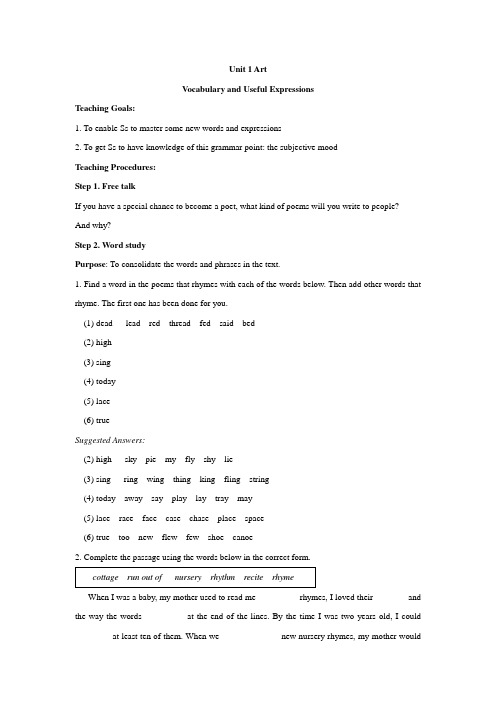
Unit 1 ArtVocabulary and Useful ExpressionsTeaching Goals:1. To enable Ss to master some new words and expressions2. To get Ss to have knowledge of this grammar point: the subjective moodTeaching Procedures:Step 1. Free talkIf you have a special chance to become a poet, what kind of poems will you write to people?And why?Step 2. Word studyPurpose: To consolidate the words and phrases in the text.1. Find a word in the poems that rhymes with each of the words below. Then add other words that rhyme. The first one has been done for you.(1) dead lead red thread fed said bed(2) high(3) sing(4) today(5) lace(6) trueSuggested Answers:(2) high sky pie my fly shy lie(3) sing ring wing thing king fling string(4) today away say play lay tray may(5) lace race face case chase place space(6) true too new flew few shoe canoe2. Complete the passage using the words below in the correct form.When I was a baby, my mother used to read me _________ rhymes, I loved their _______ and the way the words _________ at the end of the lines. By the time I was two years old, I could ________ at least ten of them. When we _____________ new nursery rhymes, my mother wouldgo to the store to buy another nursery rhyme book. In fact, my family loved reading so much that the living room in our __________ was full of books.Suggested Answers:nursery; rhythm; rhyme; recite; run out of; cottage.3. In English we sometimes add –ful to a noun to make an adjective. For example, wonder becomes wonderful. This means full of wonder. Now make adjectives form these nouns. Then add four other pairs you know.(1) beauty __________ (5) dread ____________ (9) __________ ____________(2) joy ____________ (6) hope ____________ (10) _________ _____________(3) sorrow _________ (7) peace ___________ (11) __________ ____________(4) delight __________ (8) power ___________ (12). __________ ____________ Suggested Answers:(1) beautiful (2) joyful (3) sorrowful (4) delightful (5) dreadful(6) hopeful (7) peaceful (8) powerful (9) thankful (10) successful (11) painful (12) useful4. Complete the table with the correct nouns, verbs, adjectives or adverbs.Suggested Answers:5. Complete each sentence using the correct word from the table you have just completed. (1) While you were reciting the poem, I think you moved your body very __________. It made the performance much more interesting.(2) Ad I lay in the _________, the words of a new poem came into my head.(3) The teacher doesn’t think that the _________ of the Tang poem is very good.(4) Songs are often easy to remember because they ________ a lot of poetry.(5) Your talk was so _________ that I want to go and write lots of poetry.(6) I loved the strong images you used in your poem to convey feelings of _________.(7) We were very __________ by the students’ performance of their poetry.(8) We passed the afternoon very _________ reading poetry together under the trees.(9) Mr. Tanner’s love of poetry has ________ the students’ feelings towards the subject.(10) Even though it is cold, your poem about summer has made me feel really ________. Answers:(1) expressively (2) darkness (3) translation (4) repeat (5) inspirational (6) anger (7) impressed (8) enjoyably (9) transformed (10) warmStep 3. Grammar1. PresentationPurpose: To revise the usage of the subjunctive mood with Ss.此表中需要注意几点:(1) be动词在表示与现在事实相反的从句中一般用were.在非正式情况先,第一、第三人称后偶尔也用was. 如:If he were you, he would go at once.(2) 主句中的should 通常用于第一人称,would,could以及might可以用于各种人称。
人教版高中英语选修六:Unit+2+Poems+Teaching+plan+教案.doc
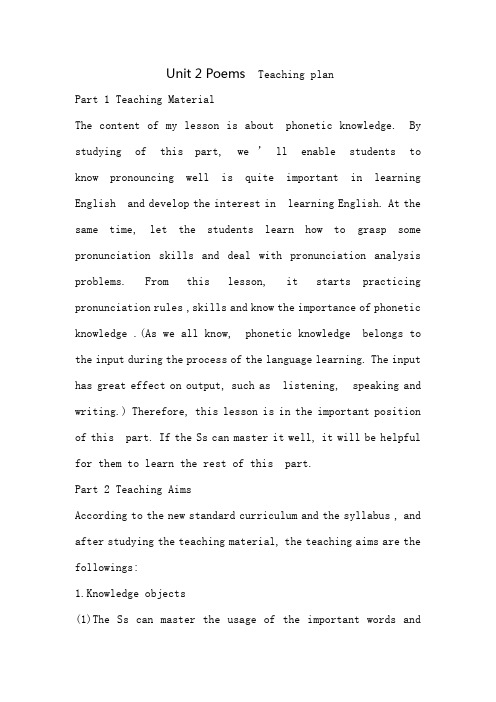
Unit 2 Poems Teaching planPart 1 Teaching MaterialThe content of my lesson is about phonetic knowledge. By studying of this part, we’ll enable students to know pronouncing well is quite important in learning English and develop the interest in learning English. At the same time, let the students learn how to grasp some pronunciation skills and deal with pronunciation analysis problems. From this lesson, it starts practicing pronunciation rules ,skills and know the importance of phonetic knowledge .(As we all know, phonetic knowledge belongs to the input during the process of the language learning. The input has great effect on output, such as listening, speaking and writing.) Therefore, this lesson is in the important position of this part. If the Ss can master it well, it will be helpful for them to learn the rest of this part.Part 2 Teaching AimsAccording to the new standard curriculum and the syllabus , and after studying the teaching material, the teaching aims are the followings:1.Knowledge objects(1)The Ss can master the usage of the important words andexpressions.(2)The Ss can use the pronunciation skills in the proper situation.(3)The Ss can understand the content of the lesson, talk about the importance of phonetic knowledge and get their own idea about pronunciation.2.Ability objects(1) To develop the Ss’ abilities of listening, speaking, reading and writing(2) To guide Ss to set up effective studying strategies.(3) To improve the student’s pronunciation ability, especially their learning English ability.(4) To train the Ss’ abilities of studying by themselves and cooperating .3.Emotion or moral objects(1)By completing the task, the Ss increase their interest in learning English and set up self-confidence in learning English .(2)Teach the Ss how to pronounce and how to deal with pronunciation analysis problems , put the moral education in the language study.Part 3 the Important and Difficult PointsBased on the requirement of the syllabus.The important points are pronunciation skills such as the pronunciation of /igz / and /eks / .The difficult points are pronunciation analysis problems, for example “explanation”-/eks/, “explain”-/iks/.Part 4 Teaching MethodsAs is known to us all, a good teaching method requires that the teacher should help Ss develop good sense of the English language. For achieving these teaching aims, (after the analysis of the teaching material and teaching aims,) I will use the following methods according to the modern social communication teaching theories .1. Communicative Approach2. Whole Language Teaching3. Task-based Language Teaching4. Total Situational Action a “scene — activity” teaching method , it establishes a real scene and the interaction between the teacher and the Ss. At the same time, CAI can provide a real situation with its sound and picture, it can develop the Ss creativity in learning English.Part 5 Teaching ProcedureStep 1. Lead-in. (4 min)Play a song of <<DO RE MI>>.Let Ss to sing along with it and pay attention to pronunciation.Purpose of my design: (1) to catch Ss’ attention about the class/topic/passage.(2) To set up suspense/develop interest in pronouncing beautifully.Step 2. Practice pronunciation.Task 1. (Individual work, pair work, group work, class work;6 min)Let Ss Practice pronunciation of “/θ/”and “/ʃ/”with partners. This part contains Minimal pairs, practice sentences and Jazz Chants.Task 2. (Individual work, pair work, group work, class work ;8 min )Let Ss Practice pronunciation of “/ i:/”and “/I/”with partners. This part contains practice words, sentences and Old MacDonald.Now, let’s see what happened to the Ss’pronunciation / let’s check whether it is right or not.Purpose of my design: (1) to get to know something about the pronunciation skills.(2) To have a better understanding about the importance of phonetic knowledge..Step 3. Pronunciation analysisTask 1. (Individual work, pair work, group work, class work; 9 min)Let Ss to read carefully and take notes.1. Pronunciation of “V-ed”;2. Pronunciation of “Ex”;3. Pronunciation of “ea”.Task 2. (Individual work, pair work, group work, class work; 15 min)Guide Ss to read the material carefully and take some important notes, then do some exercises of Shaanxi province college entrance examination in 2013..Ask Ss to read the material carefully and find out the correct answers to finish the following exercises of Shaanxi province college entrance examination in 2013.Purpose of my design: Enable students to understand the given material better by using pronunciation skills. And proper competition can arouse the Ss’ interest in English learning. “Task-based” teaching method is used here to develop the Ss’ability of communication and also their ability of co-operationwill be well trained.Step 4. Practice in group ( 3 min)Ask Ss to review their notes.Discuss the Pronunciation of 48 international phonetic alphabet with other group members and then choose a reporter to share their opinions about the correct pronunciation and read out aloud with the whole class.Purpose of my design: I think If the Ss can finish this task well, they will benefit a lot in their spoken English. Most Ss can take their parts in the activities, especially for the Ss who have trouble in English study.Step 5. Homework1. Read words ,sentences and sing an English song to practice pronunciation well.2.Do exercises about dealing with pronunciation analysis problemsPurpose of my design: Homework is so important and necessary for to master the knowledge they learned after class. It will check whether the Ss achieve the teaching aims.精美句子1、善思则能“从无字句处读书”。
人教版高中英语选修六:Unit4教案+
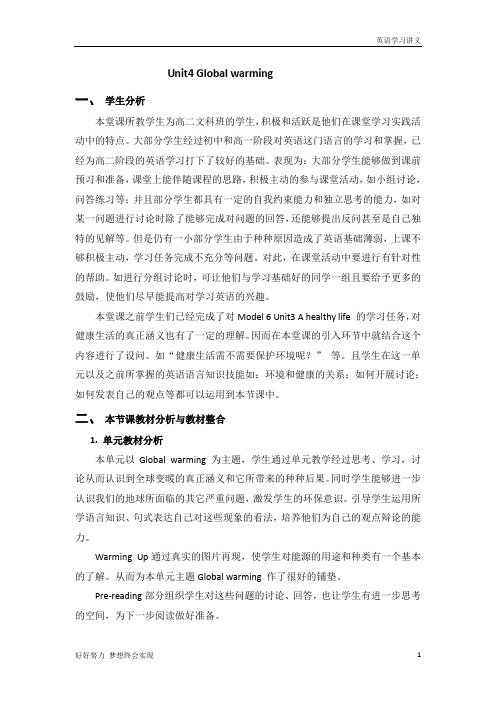
Unit4 Global warming一、学生分析本堂课所教学生为高二文科班的学生,积极和活跃是他们在课堂学习实践活动中的特点。
大部分学生经过初中和高一阶段对英语这门语言的学习和掌握,已经为高二阶段的英语学习打下了较好的基础。
表现为:大部分学生能够做到课前预习和准备,课堂上能伴随课程的思路,积极主动的参与课堂活动,如小组讨论,问答练习等;并且部分学生都具有一定的自我约束能力和独立思考的能力,如对某一问题进行讨论时除了能够完成对问题的回答,还能够提出反问甚至是自己独特的见解等。
但是仍有一小部分学生由于种种原因造成了英语基础薄弱,上课不够积极主动,学习任务完成不充分等问题。
对此,在课堂活动中要进行有针对性的帮助。
如进行分组讨论时,可让他们与学习基础好的同学一组且要给予更多的鼓励,使他们尽早能提高对学习英语的兴趣。
本堂课之前学生们已经完成了对Model 6 Unit3 A healthy life 的学习任务,对健康生活的真正涵义也有了一定的理解。
因而在本堂课的引入环节中就结合这个内容进行了设问。
如“健康生活需不需要保护环境呢?”等。
且学生在这一单元以及之前所掌握的英语语言知识技能如:环境和健康的关系;如何开展讨论;如何发表自己的观点等都可以运用到本节课中。
二、本节课教材分析与教材整合1. 单元教材分析本单元以Global warming 为主题,学生通过单元教学经过思考、学习,讨论从而认识到全球变暖的真正涵义和它所带来的种种后果。
同时学生能够进一步认识我们的地球所面临的其它严重问题,激发学生的环保意识。
引导学生运用所学语言知识、句式表达自己对这些现象的看法,培养他们为自己的观点辩论的能力。
Warming Up通过真实的图片再现,使学生对能源的用途和种类有一个基本的了解。
从而为本单元主题Global warming 作了很好的铺垫。
Pre-reading部分组织学生对这些问题的讨论、回答,也让学生有进一步思考的空间,为下一步阅读做好准备。
- 1、下载文档前请自行甄别文档内容的完整性,平台不提供额外的编辑、内容补充、找答案等附加服务。
- 2、"仅部分预览"的文档,不可在线预览部分如存在完整性等问题,可反馈申请退款(可完整预览的文档不适用该条件!)。
- 3、如文档侵犯您的权益,请联系客服反馈,我们会尽快为您处理(人工客服工作时间:9:00-18:30)。
选修六Unit1 Art 一、语言要点IV 重点词汇(旨在提供综合运用所需材料)1.faith n.信仰;信任;信心[重点用法]have faith in sb./sth.对某人/某事有信心lose faith in 不再信任,对…失去信心be faithful to sb. [sth.] 忠实于某人[某事]faithful adj.忠实的faithfully adv.忠实地[典例]1) Having faith in the masses is the requirement by government.相信群众是对政府的要求。
2) Under no circumstance shall we lost faith in the future.在任何情况下,我们都不该对未来失去信心。
[练习] 汉译英1) 他对我的能力很有信心。
______________________________________________________________________________________ _2) 虽然只是一个小挫折,却让露丝对成功失去了信心。
______________________________________________________________________________________ _Keys: 1)He has faith in my ability. 2) Though it’s only a small frustration,it made Rose lose faith in success.2.aim n. 目标;目的;瞄准vi.&vt.瞄准(向某方向)努力[重点用法]take aim (at) 瞄准aim at向…瞄准;旨在,针对;志在aim high胸怀大志; 力争上游[典例]1) What is your aim in life?你生活的目的是什么?2) He aimed the gun at the enemy officer.他用枪瞄准了敌军官。
3) Our factory must aim at developing new models of machines.我们的工厂必须致力于研制新型机械。
[练习]根据句子的意思在横线上填人适当的词或词组。
1) This anti-smoking campaign mainly____ (针对)young teenagers.2) The hunter____ (瞄准)the lion and fired3) He ______ (力求)at accuracy.4) He could not ________ (瞄准)straight.5) He is leading a life without _____(目标,方向).Keys:1)aims at 2)aimed at 3) aimed 4) aim 5) aims3.typical adj. 典型的, 象征性的;不出所料;特有的[重点用法]be typical of…是…代表; 象征[典例]1) Xianglin shao is a typical character in Leiyu典型人物2) grasp typical cases抓典型3) It’s typical of her to be late.她这个人就是爱迟到。
[练习] 汉译英1) 抢挑重担是他的特点。
______________________________________________________________________________________ _2) 温暖,潮湿的气候在南方很典型。
______________________________________________________________________________________ _Keys: 1) It is typical of him to take hard jobs . 2) Warm and wet weather is very typical in south China.4.adopt vt. 采用,采纳; 收养[重点用法]adoption n.采用;收养形近词:adapt v. 使适应, 改编adaptation n. 适应, 改编, 改写本[典例]1) In the meeting, all the works agreed to adopt a new idea to reform the factory.会议中所有员工都同意采纳新意见以改革工厂.2) Many new couple are eager to adopt the children losing their parents in the earthquake.许多新夫妇都期望可以收养在地震中失去双亲的孩子.[练习] 汉译英1)健康而没有孩子的夫妇依法可以收养一个小孩。
______________________________________________________________________________________ _2)这部影片是为了孩子们从一本很受欢迎的小说改编而来______________________________________________________________________________________ _Keys: 1) The healthy couple without children can adopt a child by law. 2) The film was adapted from the popular novel for children.5.convince vt. 使确信;使信服[重点用法]convince sb. of sth.使某人相信某事convince sb to do sth说服某人做某事be convinced of sth相信某事be convinced that+从句相信某事[典例]1) He was convinced of his error. 他认识了错误2) He convinced me that I should study law.他劝我应该学法律。
3) It took many hours to convince the court of his guilt.花费了许多个小时法庭才相信他有罪。
4) We convinced Anne to go by train rather than plane.我们说服了安妮放弃乘飞机而坐火车走。
【高考考例分析】To catch up with the times, we must keep ourselves __________of the current news.A.warnedB. informedC. convincedD. accused[解析] 本题考查四个动词的含义,这四个词都可以与of搭配,warn sb. of sth.警告某人某事,inform sb. of sth.通知某人某事,convince sb. of sth.说服某人相信某事,accuse sb. of sth.指控某人某事。
本句译为:为了跟上时代,我们必须使自己知道当前的新闻。
[答案] B[练习]根据句子的意思在横线上填入适当词或词组。
1) He_____ me ____ his innocence.2) After his discussion, I ______ that I was wrong.3) It is no use trying ________ him to quit smoking.Keys: 1)convinced…of 2)was convinced 3)to convince6.attempt n. 努力;尝试;企图vt.尝试;企图[重点用法]attempt sth.试图做……; 努力去执行(完成)某事attempt to do企图做某事make an attempt at sth/to do sth.企图做某事[典例]1) The prisoners attempted an escape, but failed. 囚犯企图逃跑,但是失败了2) An astronaut will attempt to leave the stationary spaceship and then return to it.一名宇航员将试着离开停着的宇宙飞船,然后再回到里面去。
3) The boys made an attempt to leave for camping but were stopped by their parents.男孩子们想去野营但被他们的父母们拦住了。
[练习] 汉译英1) 我试图与她取得联系。
______________________________________________________________________________________ _2) 他无意进行这件事情。
______________________________________________________________________________________ _Keys: 1) I attempted to get in touch with her. 2) He made no attempt to carry it out.7.predict vt.预言;预告;预测(侧重从已知的事实推断或根据自然规律断定未来的事情。
[重点用法]predict sth.predict thatprediction n.预言, 预报[典例]1) An eclipse could be predicted in ancient days.很久以前就可以预报日(月)蚀了。
2) His teacher predicted that he could be a CEO of a company because of his intelligence and diligence.因为他的聪明和勤奋,他老师预测他以后有可能成为公司的总裁。
3) Do you take seriously his prediction of a government defeat?他预言政府要挫败,你认为这话靠得住吗?[练习] 汉译英1) 观察员预测加沙地区形势最起码会持续一个月。
